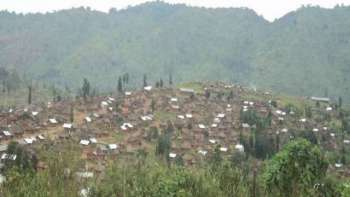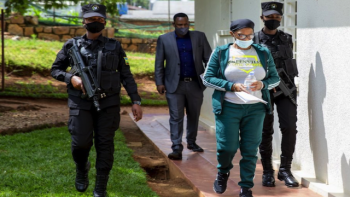As 2024 started, African dictators have persisted in holding onto power and grooming their sons and daughters as heirs. In the most recent years, some dictators were deposed or killed. Meanwhile, many African dictators have remained in power, including some already featured among AfroAmerica Network African ruthless dictators (Africa: African Dictators of 2021; 3 Down, More to Go). New dictators have been trying to join the ranks.
Senegal: Attempts for a Dictatorship.
On February 3, 2024, hours before the campaign started, Senegalese president Macky Sall called off the 2024 presidential election, setting off a constitutional crisis in Senegal. His action was unprecedented in the country, as Senegal has been one of the most stable democracies in Africa and one of the very few countries in Africa that have never had a military coup. After serving the two terms allowed in Senegal constitution, having been first elected in 2012, his decisions were viewed as attempts to overstay in power, despite his promises.
Following the recent tensions and protests, the Senegalese government announced that the presidential elections will be held on March 24, 2024. It was a celebration by the people with manifestations focusing on the victory over President Macky Sall's attempts to become a new African dictator.
Guinea Conakry: Coup after Coup.
Mali: Coup after Coup.
The coup in Mali in May 2021, by Colonel Assimi Goïta against Bah N'daw, was a result of months of unrest following accusations by the opposition against President Ibrahim Boubacar Keïta of irregularities in the March and April 2020 parliamentary elections and the kidnapping of opposition leader Soumaila Cissé. Following the May 24, 2021 coup, Colonel Assimi Goïta became the new dictator after forcing the dictator Bah N'daw to resign. On 20 July 2021, dictator Assimi Goïta survived an assassination attempt. In 2023, the military junta under Assimi Goïta indefinitely postponed a presidential election that was scheduled for early 2024, just repeating similar dictatorship maneuvers by Bah N'daw. Since the military coup, Mali’s military leaders have built closer relations with Russia and the private army Wagner Group.
Niger, Mali, and Burkina Faso, all ruled by military leaders who seized power in 2023, 2020 and 2022, respectively, have pledged dictatorship solidarity.
Niger: A Dictator After Dictators.
On July 25, 2023, General Abdourahamane Tchiani, Niger's presidential guard, with the help from Gen. Salifou Modi, overthrew President Mohamed Bazoum in a coup and held him as a prisoner. During protests following the coup, hundreds of people, who supported the coup, gathered outside the National Assembly, holding some Russian flags and hand-written signs saying: "Down with France" and "Foreign bases out". The protesters accused Mohamed Bazoum of being a puppet of France's Emmanuel Macron and Rwandan dictator Paul Kagame ( see here Niger- France - Rwanda: Accused of Being a Puppet of France's Emmanuel Macron and Rwanda's Paul Kagame, Niger President Mohamed Bazoum Overthrown)
General Abdourahamane Tchiani immediately aligned with others military junta ruling countries in the region, especially in Burkina Faso and Mali. Since independence in 1960, Niger has known five military coups. General Abdourahamane Tchiani has decided to remain in power for up to three years, before any transition back to a civilian government and elections. Despite sanctions and pressure from the powers around the world, including short lived sanctions by the Economic Community of West African States (ECOWAS), the Nigerian military junta has continued to reinforce its hold onto power.
Tchad: A Dictator Killed and Replaced by His Son, Who Turned into Dictator.
In April 2021, Chad’s long time ruling dictator Idriss Déby, addressed as Marshal Idriss Déby Itno, was killed following intense fighting against rebels. He was replaced by his 37-year-old son, General Mahamat Idriss Déby Itno (see African Dictators, Sons, and Daughters: Chad Dictator Idriss Deby Killed and Replaced by His son).
Idriss Déby had ruled Chad for more that 30 years, after seizing power in a coup in December 1990, as a leader of a rebellion against the dictator Hissène Habré. He survived various rebellions and coup attempts against his own rule. He won elections in 1996 and 2001. He then eliminated term limits in the constitution, which allowed him to claim the elections in 2006, 2011, 2016, and 2021. In 2020, he gave himself the title of Marshal.
The military rule by General Mahamat Idriss Déby Itno was rejected by opposition political parties. He later agreed to be accepted as an interim leader for 18 months, but later decided to extend his rule by two more years. Since then, many civilians have been killed in protests, which the government has been condemning as attempted coups. Opposition leaders have also been killed being accused of leading attacks against security forces during protests by civilians. Hence, the country is facing an unstable situation ahead of the presidential election scheduled for May 6, 2024.
Gabon: After Ali Bongo Ondimba .
After being groomed by his father for years, Ali Bongo Ondimba took over power after his father died. He held onto power with an iron grip for 14 years. On October 30, 2023, senior Gabonese military officers, led by Brice Oligui Nguema, his cousin and commander of the Republican Guard, overthrew him. The coup happened after the state election body announced that Ali Bongo had won a third term, in an controversial election the opposition described as a ‘fraud orchestrated’ by the ruling party. Him and his father's reign had been in power for almost 56 years. ( see Africa - Gabon: African Dictators in 2023; Ali Bongo Ondimba of Gabon Down, More to Go. Who is Next?). A week after the coup, Brice Oligui Nguema ordered the release of his cousin Ali Bongo Ondimba on medical grounds. Following the release, Ali Bongo Ondimba has reportedly been living in his private mansion in Libreville. Meanwhile, there are no clear timelines for the transition to democratic rule in Gabon.
African Dictators Who Still Matter.
Advertisement
Get the following books on Amazon:

Legs of Tornado: The Human Who Outran the Wind, an African tale about a human from a humble upbringing who outran the wind, defeated evil spirits, overcame his fate, became a respected clan chief, and triumphed ever after.
Click Here to Get the books: Even Roosters Dream to Fly and Legs of Tornado
Even Roosters Dream to Fly along with Legs of Tornado are also available on Amazon worldwide and soon on several other platforms:
For more on the book, the author, the inspiration of the stories, Visit the author website here
Check the Book Video trailer of Even Roosters Dream to Fly, here
The Guinean dictator Alpha Condé, Tchadian dictator Idriss Déby, and Gabon dictator Ali Bongo Ondimba had changed their countries’ constitutions to allow them to run for additional illegal terms. Their actions are a reminder of what most dictators across Africa have been doing.
Among the most ruthless African dictators are:
- Yoweri Museveni of Uganda, 79, born in 1944 and dictator since 1986. When he overthrew another dictator in 1986, he promised to leave power in 1990, then in 1996, then in 2001, then in 2006, then in 2011, then in 2015, then never. In 2000, he told Los Angeles Times: "I will leave office, for sure, because I am not a hereditary king. I would be very glad to leave office, once I have served my term. To be remembered, just as a freedom fighter, who helped to give the people of Uganda a key to their future, to give them democracy, get rid of the dictatorship." Well, he not only remains the dictator of Uganda but also, on December 27, 2017, he amended the Constitution to remove the presidential age limit caps, allowing himlself to remain in power for life. Since then, he has been accused of wide repession against the opposition (see Ugandan Dictator Yoweri Museveni Tells Media Reasons for Clinging on Power: Ugandans are Fools and Without Direction and Western Media is Ignorant and Arrogant). Yoweri Museveni has, allegedly, been grooming his son, General Muhoozi Kainerugaba, as his successor.
- Paul Kagame of Rwanda, 66, and dictator since 1994. Paul Kagame often talks about tolerance, openeness, reconciliation, and giving power to the Rwandan people, but, for now, he is mostly known for his authoritarian streak and an impressive record of bloody repression and massive systematic crimes both inside Rwanda and in neighboring countries, since 1990. Initially claiming to be ready to release power, Paul Kagame, in 2015, when his second term allowed by the constitution progressed, decided to rewrite the term-limit clause of the Rwandan constitution, to allow him to run for a third term in the 2017 elections and remain in power for life. Hence, more recently, he has once again decided to run for another term in upcoming controversial presidential elections, after which he is expected to be declared president. However, given his widely reported declining health, Paul Kagame has, allegedly, been grooming his daughter, Ange Kagame, as the successor to the throne (see Ailing Rwandan Paul Kagame's Attempts to Cling to Power Through His Daughter Ange Kagame). The speculations were recently fueled when, while confirming his run for another term, he said that he would not mind being replaced by a young person within an age range, that, according to political analysts, would include his daughter's age. He is now isolated around the World for the invasion of Democratic Republic of the Congo (DRC) by Rwandan Defense Forces (RDF) under the cover of M23 rebels.
- Paul Biya of Cameroon, 91, born in 1933 and dictator since 1982. Initially a promising bright and visionaly democratic leader, he has now turned into a senile dictator, awaiting to leave power only by death.
- Denis Sassou Nguesso of the Republic of Congo, 79, born in 1943 and dictator between 1979-1990 and then since 1997. He was forced to give up power in 1990 and then led a bloody civil war to retake power in 1997. His nepotism is known around the World (see Kleptocrat Dictators and Sons: US vs. Denis Christel Sassou-Nguesso)
- Teodoro Obiang Nguema Mbasogo of Equatorial Guinea, 81, born in 1942 and dictator since 1979. He is one of the most corrupt leaders in Africa. Yet, he overthrew his uncle Macías, after the latter ordered the murders of several members of their relatives, including Obiang's brother. Obiang and others in Macías' inner circle feared the president had become insane. Obiang overthrew his uncle on 3 August 1979 in a bloody soup, tried him for genocide and executed him by a firing squad on 29 September 1979. Since then, he has become the copy of his uncle, with the sole difference that he has pushed nepotism to the extreme (see African Kleptocrat Dictators: Like the US, the European Union Steps Up Investigation Efforts)
- Faure Essozimna Gnassingbé Eyadéma, 58, born in 1966 and dictator since 2005. After being groomed by his father Gnassingbé Eyadéma, he became president after his father's death in 2005. Gnassignbé Eyadéma became the president of Togo from 1967 until his death in 2005. He rised to the presidency after two successful military coups, in January 1963 and January 1967, and became president on 14 April 1967. During the presidency, Gnassignbé Eyadéma prepared his son to be the successor to the presidency. Hence, Faure Essozimna Gnassingbé Eyadéma was appointed by his father as Minister of Equipment, Mines, Posts, and Telecommunications, serving from 2003 to 2005. In 2002, the constitution was ammended to lower the eligibility age for the presidency from 40 to 35 to match the age of Faure Essozimna Gnassingbé Eyadéma, then 36 years-old.
- Alassane Ouattara of Ivory Coast, 82, born in 1942 and dictator since 2011. Alassane Ouattara forced a third term in 2020 after illegally changing his country’s constitution. His attempts to change the constitution and the country legal provisions started early, even before he became president (see Africa: African Dictators of 2021; 3 Down, More to Go). Alassane Ouattara’s decision to run for president in 2020, following the sudden death of his successor and prime minister, Amadou Gon Coulibaly, on July 8, 2020, provoked an outcry and reinforced his dictatorship ambitions. The next presidential elections are expected to be held in October 2025. Dictator Alassane Ouattara has not yet said whether he will run again, but many believe he will.
Meanwhile, on March 10, 2024 Ivory Coast ex-President Laurent Gbagbo declared that he will stand in 2025. In 2010 Laurent Gbagbo refused to accept his defeat when he was president running for another term, sparking conflicts. He was tried by the International Criminal Court (ICC) on charges relating to his role in a civil war and acquitted in 2019 and then returned to Ivory Coast in 2021.
What is Next for African Dictators.
One key lesson for African dictators remains the one in Sudan. On April 11, 2019, Sudan dictator Omar Hassan Ahmad al-Bashir was removed by the military after months of anti-government protests against his three-decade rule. Women played a major role in his removal from office. Since then, Omar Hassan Ahmad al-Bashir has been facing charges of genocide, war crimes and crimes against humanity in Darfur. The new Sudanese government has committed to hand Omar al-Bashir over to the International Criminal Court (ICC) along with other officials wanted over the crimes in Darfur. In April 2023, Omar Hassan Ahmad al-Bashir, Abdel Raheem Muhammad Hussein and Ahmad Muhammad Harun, who were held in custody until the outbreak of fighting in Khartoum in April 2023 were moved from one prison to a hospital. The ICC has been requesting that the Sudanese authorities hand them over to the Court to face justice.
©2024 AfroAmerica Network.
















